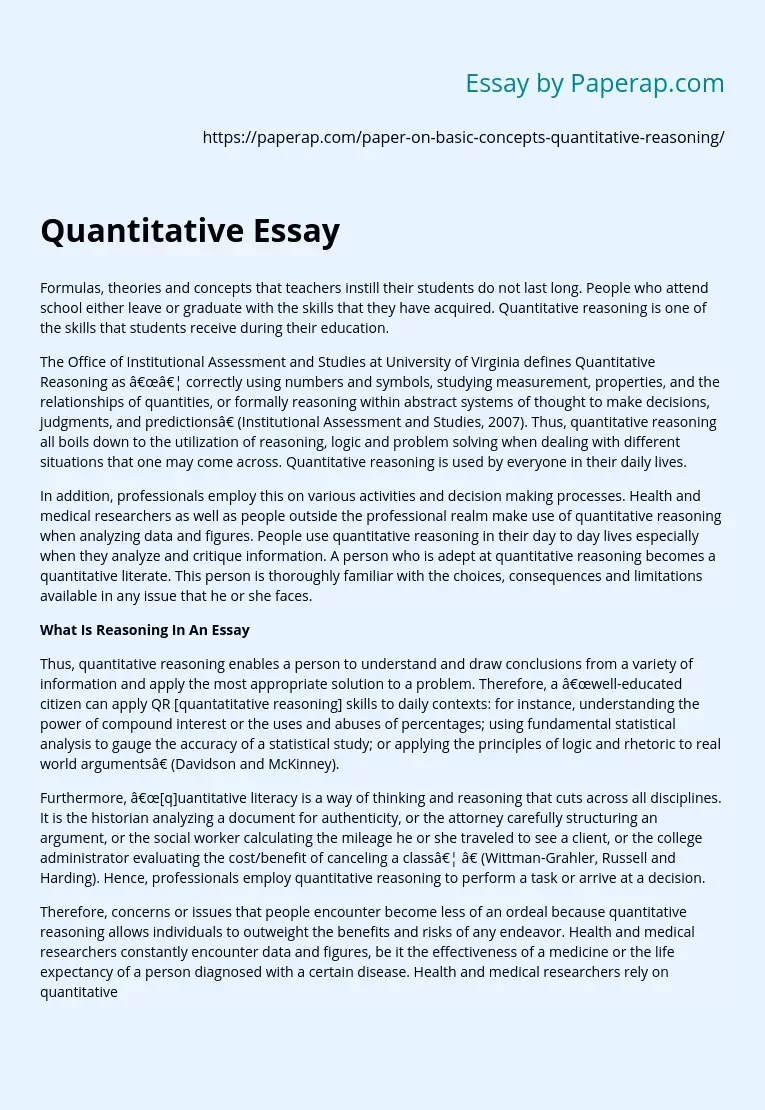Formulas, theories and concepts that teachers instill their students do not last long. People who attend school either leave or graduate with the skills that they have acquired. Quantitative reasoning is one of the skills that students receive during their education.
The Office of Institutional Assessment and Studies at University of Virginia defines Quantitative Reasoning as “… correctly using numbers and symbols, studying measurement, properties, and the relationships of quantities, or formally reasoning within abstract systems of thought to make decisions, judgments, and predictions” (Institutional Assessment and Studies, 2007).
Thus, quantitative reasoning all boils down to the utilization of reasoning, logic and problem solving when dealing with different situations that one may come across. Quantitative reasoning is used by everyone in their daily lives.
In addition, professionals employ this on various activities and decision making processes. Health and medical researchers as well as people outside the professional realm make use of quantitative reasoning when analyzing data and figures. People use quantitative reasoning in their day to day lives especially when they analyze and critique information.
A person who is adept at quantitative reasoning becomes a quantitative literate. This person is thoroughly familiar with the choices, consequences and limitations available in any issue that he or she faces.
What Is Reasoning In An
Thus, quantitative reasoning enables a person to understand and draw conclusions from a variety of information and apply the most appropriate solution to a problem. Therefore, a “well-educated citizen can apply QR [quantatitative reasoning] skills to daily contexts: for instance, understanding the power of compound interest or the uses and abuses of percentages; using fundamental statistical analysis to gauge the accuracy of a statistical study; or applying the principles of logic and rhetoric to real world arguments” (Davidson and McKinney).
Furthermore, “[q]uantitative literacy is a way of thinking and reasoning that cuts across all disciplines. It is the historian analyzing a document for authenticity, or the attorney carefully structuring an argument, or the social worker calculating the mileage he or she traveled to see a client, or the college administrator evaluating the cost/benefit of canceling a class… ” (Wittman-Grahler, Russell and Harding). Hence, professionals employ quantitative reasoning to perform a task or arrive at a decision.
Therefore, concerns or issues that people encounter become less of an ordeal because quantitative reasoning allows individuals to outweight the benefits and risks of any endeavor. Health and medical researchers constantly encounter data and figures, be it the effectiveness of a medicine or the life expectancy of a person diagnosed with a certain disease. Health and medical researchers rely on quantitative data and their skills to provide reliable data that will help medical professionals base life-altering decisions.
Thus, statistics aids health and medical researchers and professionals because “[c]ollecting and analyzing data with quantitative strategies includes understanding the relationships among variables. ” (Maldonado). As Wittman-Grahler, Harding and Russell put it, “As our society becomes more information dependent…. there is an increased need for citizens to be quantitatively literate. We are bombarded daily by tables, charts, numbers, and graphs. We make financial and health care decisions based on statistics.
” However, data and figures do not revolve only in the medical or mathematical field. Sport fanatics, gamblers and drivers-for instance- deal with figures in some way. Hence, analyzing and interpreting data and figures to arrive at a conclusion go beyond the professional field. Quantitative reasoning is an essential skill that everyone must possess. It helps a person deal with the challenges of daily life by being equipped with the proper reasoning, logic and problem solving capabilities.
These include interpreting and analyzing data, explicating facts, and drawing conclusions to come up with the best or most appropriate solution to a situation.
References: Maldonado, R. (n. d) In search of truth through quantitative reasoning. Retrieved January 9, 2008 from http://www. socialresearchmethods. net/tutorial/Maldon/validity. htm Institutional Assessment and Studies. (2007, October 31). Reports: Quantitative Reasoning Competency. Retrieved January 7, 2008.
Teaching Short-Term Theories and Concepts. (2019, Dec 05). Retrieved from https://paperap.com/paper-on-basic-concepts-quantitative-reasoning/

